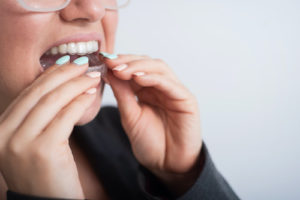Most people know that nightguards are an effective remedy for teeth grinding. However, many people don’t know that you can be a nighttime teeth grinder and not even be aware of it. That’s why it’s important to know the signs of teeth grinding. Are you waking up with unexplained headaches? Are your teeth becoming more sensitive? If so, you may be a nighttime grinder. The formal name for teeth grinding is bruxism. If you suspect you’re experiencing bruxism, speak to your dentist at Lovett Dental Cinco Ranch about it.
Is Bruxism a Serious Condition?
 Lovett Dental Cinco Ranch is concerned about safeguarding your oral health. They can determine whether you need night guards for bruxism or night guards for TMJ. Not only that, but we are an interdisciplinary dentist that offers the following services:
Lovett Dental Cinco Ranch is concerned about safeguarding your oral health. They can determine whether you need night guards for bruxism or night guards for TMJ. Not only that, but we are an interdisciplinary dentist that offers the following services:
- Dental veneers
- Implant-supported dentures
- High-end cosmetic dentistry
- General dentistry
- Children’s dentistry
Occasional mild teeth grinding may not be a problem. However, prolonged and severe grinding is painful and inconvenient, and the associated problems don’t end there. Bruxism can also damage dental work and loosen teeth. In severe cases, it might cause chipping and cracking. It can cause pain in the temporomandibular joint (TMJ), the hinge that connects the jaw to the skull. It might cause difficulty chewing and affect the appearance of your smile.
Visit your dentist regularly to prevent bruxism from damaging your oral health. A checkup can catch problems in the early stages and prevent severe consequences.
How Do I Know I’m Teeth Grinding?
Bruxism may occur during the day, but often it happens at night when you’re unaware of it. Even so, there are ways to recognize that you’re grinding during your sleep. Some common signs of teeth grinding include:
- Facial pain
- Overly sensitive teeth
- Tension in face and jaw
- Headaches
- A clicking or popping sound in the TMJ
- Fatigue from lack of sleep
Also, other signs, such as worn teeth and interior cheek damage, are difficult to detect without consulting a dentist for dental services.
What Causes Bruxism?
Often bruxism is a response to pain. Colds, ear infections, and allergies cause pain that can lead to teeth grinding. Underlying dental problems are often the culprits. These include bad bites, crooked teeth, and missing teeth. Poor sleep and stress can also cause bruxism.
Stress is often the root cause. This has never been more true than it is today. Many dentists report seeing an “epidemic” of broken teeth due to grinding.
Do Nightguards Help?
Fortunately, there are several treatments for teeth grinding. One is a change in personal behavior to deal with stress.
Try not to take stress to bed with you. Reduce bedtime tension by, for example, listening to soothing music or taking a bath. Some people have had success with behavior therapy, where they learn how to properly rest their teeth, lips, and tongue without grinding.
However, nightguards are one of the widespread, easiest, and most common treatments. Nightguards are custom-made by your dentist from soft material and fit your teeth. They prevent dental surfaces from coming into stressful contact with one another. Your dentist will tell you if night guards for TMJ’s bruxism and night guards are the best solution for you. Once you’ve started wearing your nightguards, the morning symptoms such as headache and jaw soreness will likely diminish.
If you let bruxism go unattended in more extreme cases, a dentist or orthodontist may have to reshape your biting surface with treatments such as inlays and dental crowns.
Lovett Dental Cinco Ranch for Complete Mouth Care
If you suspect you’re grinding at night, don’t put your teeth at risk. Contact us at 713-244-7799 and make an appointment for a consultation on your dental health.
